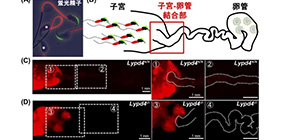
Family genes that regulate sperm’s fertilizing ability discovered via genome editing technology
A group of researchers from the Osaka University Research Institute for Microbial Diseases and Baylor College of Medicine clarified that male-specific gene clusters were essential for the sperm’s fertilizing ability.
Previously, this group efficiently produced gene knockout mice via genome editing technology CRISPR/Cas9, clarifying that 93 evolutionarily conserved and reproductive tract-enriched genes are not individually essential for male fertility in mice.
Genome engineering uncovers 54 evolutionarily conserved and testis-enriched genes that are not required for male fertility in mice ( https://www.pnas.org/content/113/28/7704 )
Nine genes abundantly expressed in the epididymis are not essential for male fecundity in mice ( https://onlinelibrary.wiley.com/doi/full/10.1111/andr.12621 )
CRISPR/Cas9-mediated genome editing reveals 30 testis-enriched genes dispensable for male fertility in mice ( https://academic.oup.com/biolreprod/article/101/2/501/5519226 )
These reports only referred to single genes, but some genes have family genes that have similar DNA sequences and functions. In the case of family genes, phenotypes are hidden, or not expressed, because remaining family genes compensate for a defective gene family member. Thus, functional analysis of family genes at the individual level did not advance.
In this study, using CRISPR/Cas9, the group generated genetically modified mice which have gene cluster deletions, discovering gene clusters required for sperm fertilizing ability.
In Japan, infertility is becoming a social problem, with one in 6 couples receiving fertility tests and subsequent treatment. Focusing on family genes that show male specific expression, this group identified family genes necessary for male fertility by making full use of CRISPR/Cas9. This group’s achievements will lead to clarification of genes that cause male infertility and the development of treatment drugs and contraceptive drugs.
Figure 1
Figure 2
The article “Identification of multiple male reproductive tract-specific proteins that regulatesperm migration through the oviduct in mice” was published in PNAS at DOI: https://doi.org/10.1073/pnas.1908736116 .
Related links
